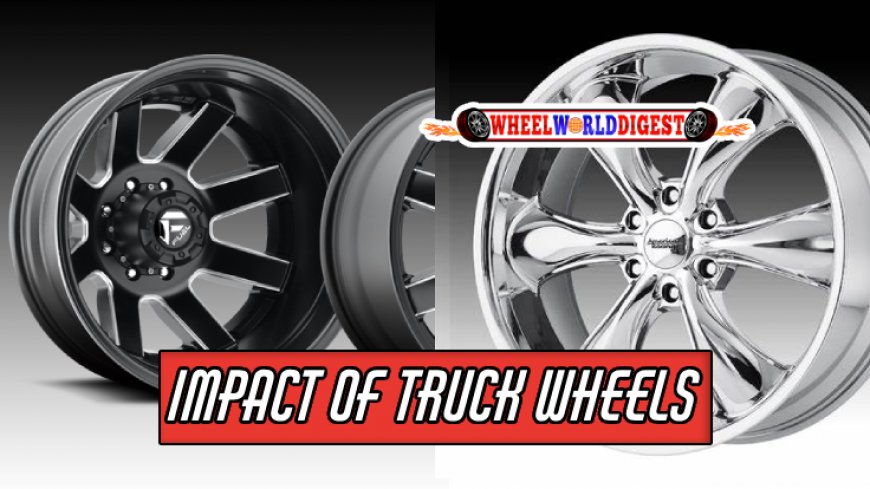Impact of Truck Wheels on Vehicle Performance
Analyse how truck wheels affect your vehicle's performance, with a focus on acceleration, braking, and maneuverability.

The impact of truck wheels on a vehicle's performance often goes unnoticed. The size, material, and design of your vehicle's wheels can significantly influence its acceleration, braking, and maneuverability. This article will delve into how truck wheels affect performance, and discuss some factors you should consider when choosing wheels for your truck.
Investigating Impact of Truck Wheels on Performance
Our investigation involves an in-depth look at various elements like the role of wheel size and material, the dynamics of wheel design, and the type of tires used. This exploration will provide a comprehensive understanding of the impact truck wheels can have on your performance.
Table of Contents
- The Role of Wheel Size in Performance
- How Wheel Material Affects Performance
- The Importance of Wheel Design
- Tire Types and their Impact on Performance
- Choosing the Right Truck Wheels
The Role of Wheel Size in Performance

When assessing the impact of truck wheels on performance, the size of the wheel significantly affects overall functionality. Wheels' sizes are identified by their diameter, measured in inches. Wheel size pertains to the diameter of the wheel's rim, not the overall height of the wheel with the tire mounted.
Considering larger wheels, typically, they offer better grip and handling compared to smaller ones. However, they also result in slower acceleration as a larger wheel makes the truck's engine work harder to turn the wheel. Vice versa, smaller wheels can increase acceleration but may compromise the vehicle's stability.
Size and Fuel Efficiency
Larger wheels have been noted to decrease fuel efficiency. The added circumference translates into more rubber on the road which increases rolling resistance and, subsequently, fuel consumption. This effect is magnified for trucks as their more powerful engines consume more fuel to move the extra weight of larger wheels.
How Wheel Material Affects Performance
Next in line is the material of the wheel. The two most common materials used for truck wheels are steel and alloy. Each has its advantages and drawbacks.
- Steel Wheels: Steel wheels are more durable and less susceptible to damage from impact. They're also less expensive. However, they're heavy, which can lower your truck's speedy acceleration and fuel economy.
- Alloy Wheels: In contrast, alloy wheels are lighter, which can improve acceleration and reduce fuel consumption. They also offer better heat dispersion, which can extend brake life. However, they can be more prone to damage compared to steel wheels.
Why is Wheel Weight Important?
Focusing on the vehicle's performance, the wheel's weight, driven by its material, can significantly impact the driving experience. Lighter wheels can offer quicker acceleration and better braking because less energy is needed to overcome rotational inertia. At the same time, heavier wheels can contribute to a smoother ride as they have a greater capacity to absorb road shocks.
The Importance of Wheel Design
Beyond the size and material, the design of the truck wheel also plays a crucial role in performance. The design elements including the layout of spokes and overall aesthetics not only add to the visual appeal but also contribute to the wheel's structural integrity.
The layout of wheel spokes affects the wheel's weight distribution and ventilation. Wheels with more and thinner spokes are generally lighter and provide better brake cooling. On the flip side, wheels with fewer but thicker spokes might be more robust but provide less brake cooling.
- "A well-designed wheel is a balance between aesthetics, structural integrity, and performance."
Tire Types and their Impact on Performance
No discussion on the impact of truck wheels would be complete without mentioning the role the tires play. The types of tires fitted to your wheels are just as influential, if not more so, in determining the overall vehicle's performance.
The Tie between Tire Types and Truck Performance
Truck tires can broadly be classified into three types:
- All-season tires: Deliver a balanced performance in terms of ride comfort, tread life, and fuel efficiency. Suitable for different weather conditions.
- All-terrain tires: Built for both on-road and off-road capabilities. These tires provide good performance on gravel, sand, and light snow. However, they may compromise a bit of highway comfort and fuel efficiency.
- Mud-terrain tires: Specifically designed for rough off-road conditions. Their aggressive tread pattern provides strong traction on mud, but they may be noisy and less efficient on highways.
Understanding the intended use of your truck could guide your decisions when it comes to selecting the right tire for your vehicle. For off-road conditions and treacherous terrains, all-terrain or mud-terrain tires could be a fitting choice. For mostly highway or city driving, all-season tires may be more fitting.
Choosing the Right Truck Wheels
Finally, when looking to amplify your truck's performance, choosing the right truck wheels can make a world of difference. Each truck and its purpose are unique, and various factors are important to consider when making a selection.
Bearing in Mind Your Driving Conditions
Driving conditions such as the types of roads, weather, and driving habits can influence your decision when choosing truck wheels. If you're regularly off-roading or embarking on rough terrains, for example, you might be more inclined to opt for steel wheels for their durability or mud-terrain tires for their strong traction.
Striking the Right Balance
The hallmark of an ideal wheel is the perfect blend of size, weight, material, design, and appropriate tires. The key is to strike a balance between performance-enhancing characteristics and personal styles preference. Remember, wheels affect both functionality and aesthetics.
No single type of wheel is superior to all others. Ultimately, the right wheel for your truck depends on the specific demands of your vehicle and your personal driving preferences. So, take the time to understand thoroughly how each factor influences performance and make an informed choice that best suits your needs.
What's Your Reaction?









































































